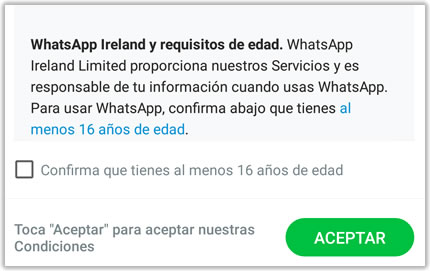As we update our WhatsApp application during these days, we will all be getting a notice about the new conditions that we must accept. The biggest novelty that we will find is the obligation to declare that we are at least 16 years old. It is an essential requirement to continue using the service.

This change in the conditions of use is due to the imminent entry into force of the new General Regulation of Data Protection (RGPD) of the European Union (EU), which will take effect from May 25 on.
WhatsApp is anticipating this date with the aim that, by then, all devices with their application in Europe will have accepted their terms. The European legislation will be very strict with companies (large and small) that deal with personal data and the security they apply. With this measure they try to maintain themselves in the strictest legality, even in an exaggerated manner, although in reality, as we all know, they will be much more permissive.
Why won’t this measure actually be enforced?
It is true that we are all going to have to accept being 16 years old or older to use the application, but surely it will not have any repercussion on the use that children under this age make of it. And there are several reasons to think so:
- It is nothing more than a check without any type of requirement. It does not require any kind of legal documentation or confirmation of age in any way.
- In Spain, the minimum age is 14. The new European Regulation establishes the minimum age to use social networks and other telematic means of communication at 16. But it also leaves open the possibility that member countries of the European community can modify that age downward. In the case of Spain, the age at which a person can legally register in one of these services is 14. In addition, it is very likely that in the future the legislation will be modified to reduce that age to 13, more in line with the rest of the member countries.
- It interests the parents themselves. The WhatsApp application has become the preferred means of communication for most people, including families with their young children. The continuous and immediate contact with their children is perceived by the parents as a tool that provides security (as it is logical) and they are hardly going to give it up even if it means violating the norm by putting a check.
- The sanction would be a temporary block. It is very unlikely that Whatsapp checks out the true age of its users, simply because it has no means to do so. In the hypothetical case that they could do it, “the punishment” for using their application at an age lower than that required would be, at most, a temporary blockage of the account.
The conclusion would be that this change in the terms of use of Whatsapp responds more to a legal protection that the responsible company seeks than to a real limitation in the age of the users. I doubt that it will affect in the least the number of users of this extended means of communication, at least not in the near future.
